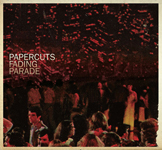|
|
 |
Dusted Reviews
Artist: Papercuts Album: Fading Parade Label: Sub Pop Review date: Feb. 28, 2011 |

|
|
|
 |
Something has gone very wrong with Jason Quever’s Papercuts over the last couple of albums. The tension in pop hallmark Can’t Go Back was between dreamy dissolution and insistent, guitar-driven forward motion. You could feel actual longing, actual striving in cuts like “Dear Employee,” and “John Brown,” a pulse of life even in their most cloud-gazing intervals. It was a great pop album, hinting at even bigger success to come. But with the follow-up, You Can Have What You Want Quever de-emphasized jangle and strum in favor of oozing atmospheres of sustained keyboard tones. It was easy to get lost in thick miasmas of sound, to lose the thread of the narrative and melody.
Fading Parade brings back the guitars, but continues the slide toward formlessness, with songs that are always pleasant but no longer very compelling. Quever is reaching for Spector’s all-enveloping wall of sound, but forgetting how grounded that sound was in classic rock ‘n’ roll rhythms. It was Spector, after all, who encased that archetypical “boom … ba-boom chick” beat into “Be My Baby;” there was a spine in even his most aura-fogged compositions.
Not so with Quever’s rainbow-colored ephemera, songs that have the staying power of soap bubbles, and hardly any connective tissue between one measure and the next. “I’ll See You Later, I Guess,” is about as anemic and effete as its title suggests, the merest trace of bass, the slightest hint of tambourine-jangle pushing the song to its conclusion. “Chills” is all whispers and insinuations, the words bleeding outward in edgeless, indefinite melodies, the drums buried low in the mix. There are some strings in “Chills” and later in “White are the Waves,” but no, they are not the kind of edgy, sawing strings that chop and unsettle. They are more smooth-ness in an album that is pretty close to unruffled. What waves? There’s hardly even a ripple here.
Not coincidentally, Quever’s most successful efforts bring up the drums. “Do What You Will,” the single, is the album’s tensest, most absorbing song. Here a steady beat bounds and encases wistful melodies, providing the framework that makes sudden flights — the soaring “Do what you will” chorus — all the more acrobatically compelling.
You have to have a certain gravity, a kind of realness, to make Quever’s untethered pop work. Too much brightly colored atmosphere, too much unruffled prettiness, and the whole things starts to look like a Teletubbies landscape, with about as much emotional weight. Fading Parade is a series of lovely little auras that you forget almost while you’re experiencing them. A little more friction, even a hint of ugliness would go a long way.
By Jennifer Kelly
|







